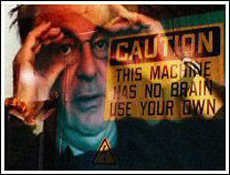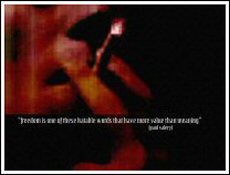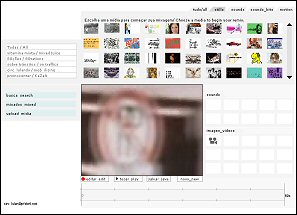Sound and Vision
Marcus Bastos
ten (or more?) minutes of freedom (and other recombinant interfaces)
Laurel Point Inn
2 pm, Friday January 27th
Marcus Bastos is PhD in Communication and Semiotics and teaches at the
Catholic University of São Paulo. He develops critical and
experimental work
on the field of digital culture. His most recent project — "ten (or more?) minutes of freedom" — won an
honourable mention from the Sérgio Motta Award, an important Brazilian
digital culture prize. Recent projects include
"In the
land of palms and threes" (Interactive DVD, 2005) and "A shard´s
book". In
2004, with the Delirious Lazyness Group, he developed "mobil_izing",
launched at SONARAMA (Tomie Othake Institute, São Paulo). In 2003, with
Priscila Arantes, he developed the website "Brazilian Digital Media",
nomitated to the 4º Prêmio Cultural Sérgio Motta. In 2002, he
developed,
with Giselle Beiguelman and Rafael Marchetti, "Weblandscape0" the only
Brazilian work listed on the selection "The 50 Best of the
international/media/art/award 2003" (ZKM, Karlsruhe, Germany).
Website: http://www.pucsp.br/~marcusbastos



|
ten (or more?) minutes of freedom (and other recombinant interfaces)
"ten (or more?) minutes of freedom" is an interactor triggered
audiovisual
essay. Multiple tracks allow control over a juxtaposed cluster of
images,
sound and video clips. The material is a selection of testimonies on
the
topic of freedom, by intellectuals such as Geert Lovink, George
Landow and
Jean-Pierre Gorin, as well as graphic or audiovisual treatments of
texts by
Paul Valéry, Jorge Luis Borges and Toni Negri, among others.
As the interactor chooses and edits the available clips, he builds
his own
reflection on the following topics: what does it mean to be free in a
society where the entertainment industry imposes a constant hegemony of
behaviors? What strategies allow people to exercise freedom, on this
context? Does contemporary networked culture allow greater freedom, by
stimulating the traffic of information that does not reach media
such as the
radio and the TV, or less freedom, by allowing tracking and
surveillance?
The recombinant structure of the DVD, developed with DIALs and
Windows for
Shockwave, both technologies created by Jim Andrews, explore forms of
incorporating generative technologies in polifonic interfaces, that
question
the stability of instituted discourses. It dialogs with former projects
where the user played an important role on the recombining of its
content,
such as "Weblandscape0", created with
Giselle Beiguelman and Rafael Marchetti, and "mobil_izing", by the Delirious Lazyness
Group. Both will also be presented at the panel, as well as "A
shard´s book", a study on the
layering of
texts and regressive reading, and "No Plata dot Us", the most recent project by Delirious
Lazyness,
where layers of text captured from Google creates an ever
changing comnentary on brazilian contemporary politics.
The common issue on this websites and DVDs is building digital
interfaces that allows the interactor to be more aware of the language
recombination possibilities available in formats that move away from
point-and-click, on portals all over the web, and remote controlled
selection of sequences, on DVDs for rental at your local video stores.
|
|
|
|

